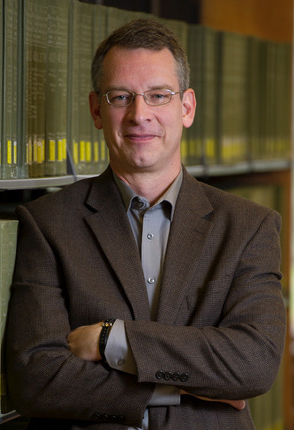Posted p.m. Sunday, Sept. 17, 2017
Notre Dame prof discusses the roots of modern consumerism.
Notre Dame prof discusses the roots of modern consumerism
A University of Notre Dame professor will speak about the upcoming 500th anniversary of the Reformation. [caption id="attachment_49778" align="alignright" width="294"] Brad S. Gregory, the Dorothy G. Griffin Collegiate Chair at the University of Notre Dame in South Bend, Indiana, will discuss arguments he raises in the fifth chapter of his book, “The Unintended Reformation,” during a presentation at UW-La Crosse Thursday, Sept. 28.[/caption]
Brad S. Gregory, director of the Notre Dame Institute for Advanced Study, will speak on "Buying In: The Roots of Modern Consumerism in the Reformation Era" at 7 p.m. Thursday, Sept. 28, in the Hesprich Auditorium, Graff Main Hall. Admission is free.
Gregory, the Dorothy G. Griffin Collegiate Chair at the University of Notre Dame in South Bend, Indiana, will discuss arguments he raises in the fifth chapter of his book, “The Unintended Reformation.” The chapter is titled “Manufacturing the Goods of Life.”
A panel discussion will follow featuring Andrew Chavanak, pastor; Jess Hollenback, UWL associate professor of history; Steve Minnema, pastor; Tony Tanke, attorney; and Melissa Troutt, UWL history student.
During Gregory’s visit to La Crosse, he will also participate in a 500th Anniversary of the Reformation Luncheon at noon, Thursday, Sept. 28, in the Viterbo University Fine Arts Center Lobby. Reservations should be made at: viterbo.qualtrics.com/jfe/form/SV_74iCKzSuXmF22RT
Gregory’s visit is sponsored in honor of the late Allen B. Birchler, a Presbyterian pastor and UWL professor emeritus. Sponsors include: the UWL Department of History, The Allen B. Birchler Lectures in Humanities Fund, the UWL Foundation, and the UWL student organization CRU.
Brad S. Gregory, the Dorothy G. Griffin Collegiate Chair at the University of Notre Dame in South Bend, Indiana, will discuss arguments he raises in the fifth chapter of his book, “The Unintended Reformation,” during a presentation at UW-La Crosse Thursday, Sept. 28.[/caption]
Brad S. Gregory, director of the Notre Dame Institute for Advanced Study, will speak on "Buying In: The Roots of Modern Consumerism in the Reformation Era" at 7 p.m. Thursday, Sept. 28, in the Hesprich Auditorium, Graff Main Hall. Admission is free.
Gregory, the Dorothy G. Griffin Collegiate Chair at the University of Notre Dame in South Bend, Indiana, will discuss arguments he raises in the fifth chapter of his book, “The Unintended Reformation.” The chapter is titled “Manufacturing the Goods of Life.”
A panel discussion will follow featuring Andrew Chavanak, pastor; Jess Hollenback, UWL associate professor of history; Steve Minnema, pastor; Tony Tanke, attorney; and Melissa Troutt, UWL history student.
During Gregory’s visit to La Crosse, he will also participate in a 500th Anniversary of the Reformation Luncheon at noon, Thursday, Sept. 28, in the Viterbo University Fine Arts Center Lobby. Reservations should be made at: viterbo.qualtrics.com/jfe/form/SV_74iCKzSuXmF22RT
Gregory’s visit is sponsored in honor of the late Allen B. Birchler, a Presbyterian pastor and UWL professor emeritus. Sponsors include: the UWL Department of History, The Allen B. Birchler Lectures in Humanities Fund, the UWL Foundation, and the UWL student organization CRU.
 Here’s what you can expect to hear about at his presentation—
“How did a religious tradition in which greed is a deadly sin give rise to the most consumerist societies in the history of the world? The Protestant Reformation of the 16th century rejected the authority of the Roman Catholic Church, but maintained the traditional — and biblical — condemnation of avarice and suspicion of the pursuit of wealth. But the intended stalemate of doctrinal disagreement between Protestants and Catholics, as well as the concrete religio-political conflicts of the Reformation era, prompted the pursuit of material prosperity across religious divides beginning in the 17th century in ways that transformed the relationship between religion and economic realities. Despite the enormous changes between then and now, the links among religion, economic pursuits, society, and politics that began, then initially among the Dutch, have persisted to the present.” –Brad S. Gregory
Here’s what you can expect to hear about at his presentation—
“How did a religious tradition in which greed is a deadly sin give rise to the most consumerist societies in the history of the world? The Protestant Reformation of the 16th century rejected the authority of the Roman Catholic Church, but maintained the traditional — and biblical — condemnation of avarice and suspicion of the pursuit of wealth. But the intended stalemate of doctrinal disagreement between Protestants and Catholics, as well as the concrete religio-political conflicts of the Reformation era, prompted the pursuit of material prosperity across religious divides beginning in the 17th century in ways that transformed the relationship between religion and economic realities. Despite the enormous changes between then and now, the links among religion, economic pursuits, society, and politics that began, then initially among the Dutch, have persisted to the present.” –Brad S. Gregory